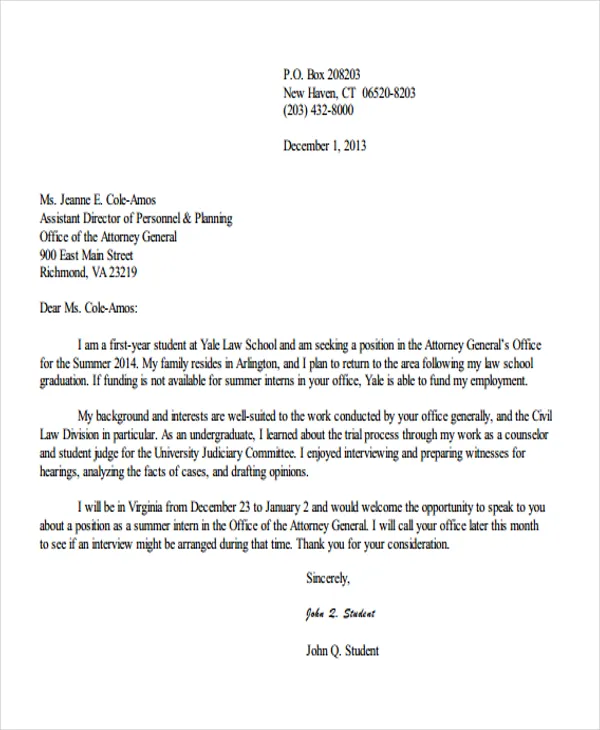Understanding the Importance of a Law Cover Letter
In the competitive field of law, a well-crafted cover letter is often the key to unlocking your career aspirations. It serves as your first impression, providing an opportunity to showcase your qualifications, passion, and suitability for a specific role. A compelling law cover letter goes beyond simply restating your resume; it allows you to narrate your story, connect your experiences to the job requirements, and demonstrate your genuine interest in the opportunity. Without a strong cover letter, your application might be overlooked, especially in a field where attention to detail and effective communication are paramount. Therefore, understanding the importance of a law cover letter is the first step towards a successful job application.
Why a Cover Letter Matters
A cover letter matters because it personalizes your application. It demonstrates to the hiring manager that you’ve taken the time to understand their needs and tailor your application accordingly. Unlike a resume, which provides a factual overview of your qualifications, a cover letter allows you to articulate your motivations and aspirations. It gives you the space to explain gaps in your experience, highlight transferable skills, and showcase your personality. In essence, it is your chance to create a human connection, which is vital in building rapport and getting noticed. A great cover letter can also differentiate you from other candidates who have similar qualifications but fail to effectively communicate their value proposition.
Highlighting Your Key Skills and Experiences
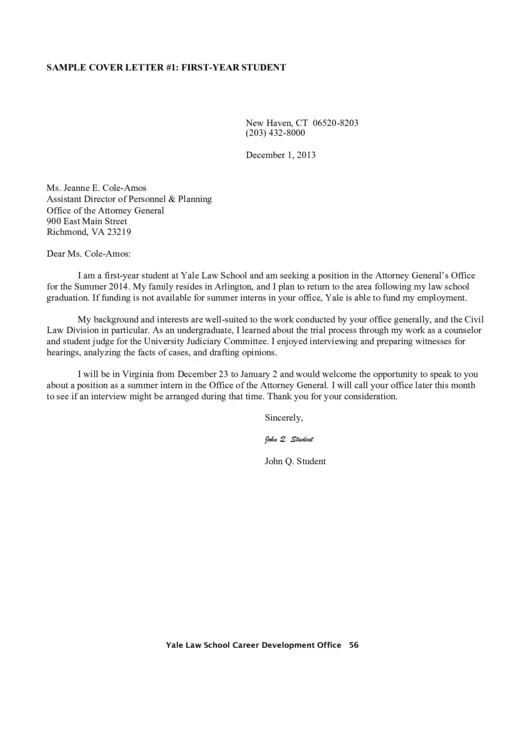
Your law cover letter is where you translate your experiences into tangible benefits for the employer. Instead of just listing your skills, you need to illustrate how you have used them to achieve results. For instance, if you have strong research skills, provide a brief example of a complex legal issue you successfully researched and the outcome. If you possess excellent writing abilities, showcase your ability to clearly and concisely convey legal arguments. Remember to align your skills with the job description and emphasize the competencies that the employer is seeking. This involves careful review of the job requirements and strategic selection of the experiences and skills most relevant to the position. This level of detail will help your application stand out.
Essential Components of a Law Cover Letter
Header and Contact Information
Your header should clearly display your contact information, including your name, address, phone number, and professional email address. It should be positioned at the top of the document and formatted consistently. You should also include the date, and the recipient’s information (name, title, law firm name, and address). Accuracy is crucial to ensure the hiring manager can easily reach you.
Professional Greeting
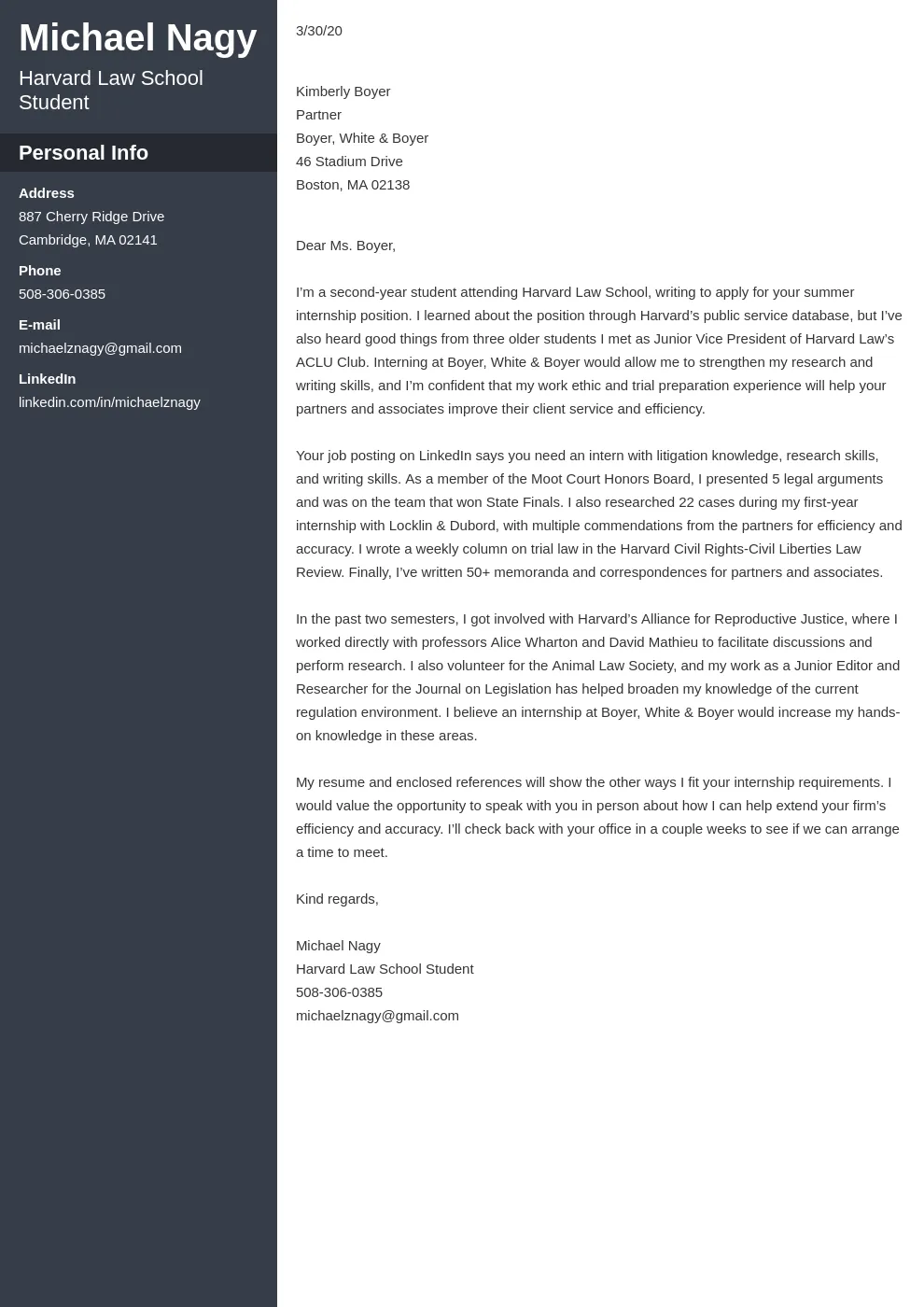
Address the hiring manager by name whenever possible. Research their name online, by checking the firm’s website or LinkedIn. This shows that you have taken the initiative to personalize your application. If you can’t find a specific name, use a professional salutation, such as “Dear Hiring Manager”. Avoid generic greetings like “To Whom It May Concern” as it can make your letter seem impersonal. A well-crafted greeting sets the tone for the rest of your letter and makes a positive impression.
Body Paragraphs Crafting Your Narrative
The body paragraphs are the core of your law cover letter. They should effectively tell your story and demonstrate how your skills and experiences align with the job requirements. This section allows you to convey your passion and communicate why you are the ideal candidate.
First Paragraph Purpose and Hook
The first paragraph should capture the reader’s attention immediately. State the position you are applying for and where you saw the job posting. Briefly mention why you’re interested in the role and the firm. This is your opportunity to make a strong first impression and grab their interest. It should be concise, enthusiastic, and clearly state your intention. This paragraph should be a hook and showcase your ability to communicate effectively and persuasively.
Second Paragraph Showcasing Skills and Experience
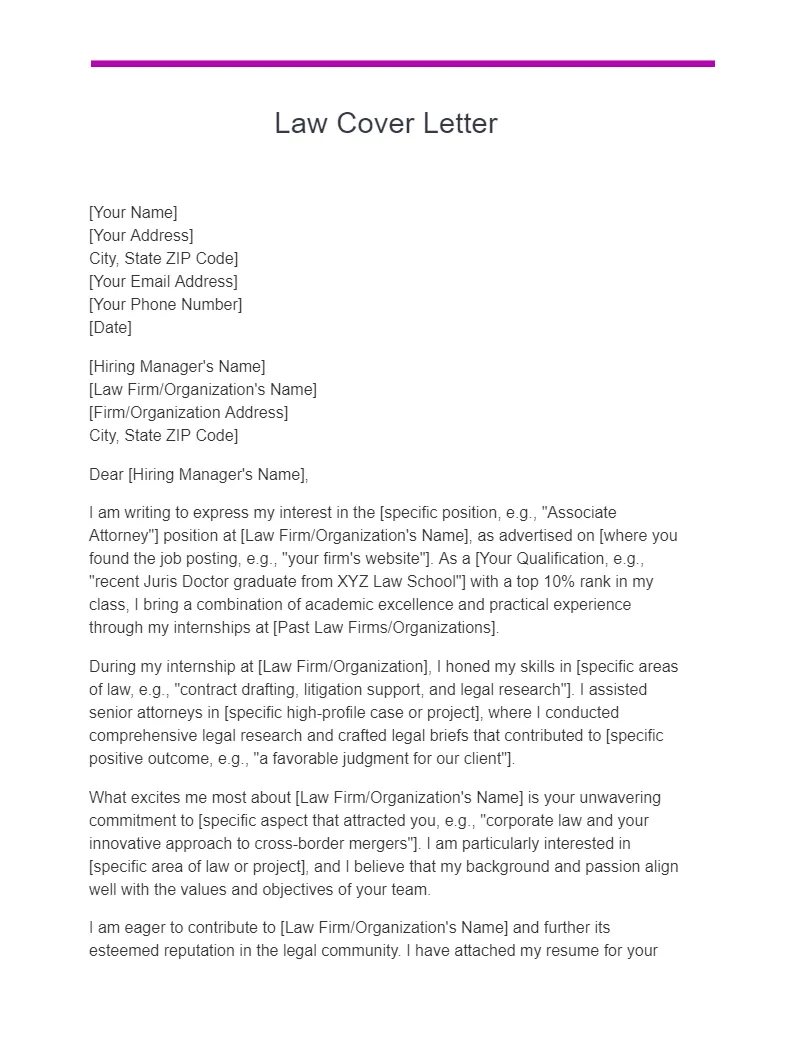
The second paragraph is where you highlight your relevant skills and experiences. Focus on the qualifications that align with the job description. Use specific examples to illustrate your abilities, detailing how you’ve used these skills to achieve success in the past. Provide quantifiable results whenever possible. For example, rather than simply stating “Managed client files”, you might say “Managed a caseload of 30+ client files, resulting in a 95% success rate in case outcomes”. Tailor this section to the specific requirements listed in the job description to demonstrate a perfect fit.
Third Paragraph Demonstrating Interest and Fit
In the third paragraph, express your genuine interest in the law firm and the specific role. Research the firm’s values, recent achievements, and any other relevant information to demonstrate your understanding of their work. Explain why you are drawn to the firm and how your career goals align with their mission. This section should demonstrate your passion for the law and your long-term commitment to the field. Show how your values and career aspirations align with the law firm’s culture and goals.
Concluding Paragraph Call to Action
Conclude your cover letter with a strong call to action. Thank the hiring manager for their time and consideration, and express your enthusiasm for the opportunity to discuss your qualifications further. Reiterate your availability for an interview and provide your contact information. This final paragraph should leave a lasting positive impression and encourage the reader to take the next step. It reaffirms your interest and commitment to the application.
Formal Closing
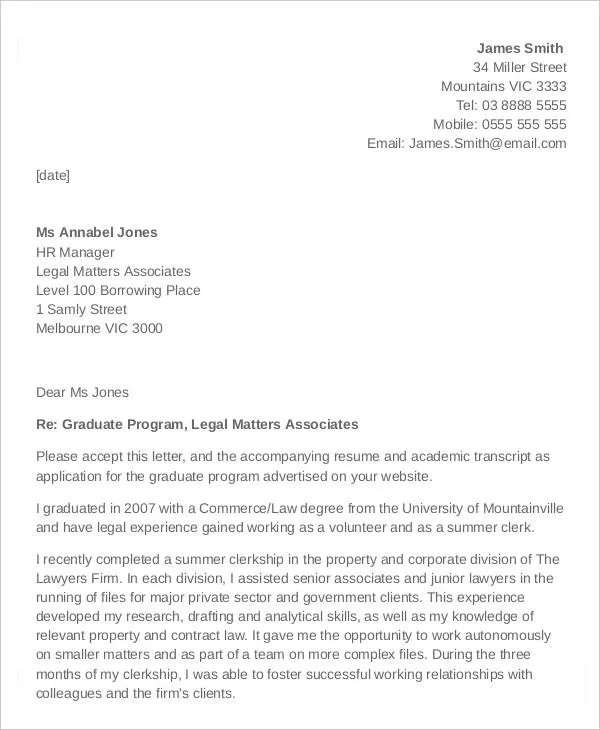
Use a professional closing such as “Sincerely”, “Respectfully”, or “Best regards”. Ensure you leave space for your signature if you are submitting a hard copy. Your closing should be professional and respectful, reflecting your attention to detail and your understanding of business etiquette.
Formatting and Style Tips
Font and Font Size
Choose a professional and readable font, such as Times New Roman, Arial, or Calibri, with a font size between 11 and 12 points. These fonts are easy on the eyes and project a sense of professionalism. Consistency is key; stick to the same font throughout the entire document. Avoid using overly decorative or unusual fonts that could detract from the content of your letter.
Margins and Spacing
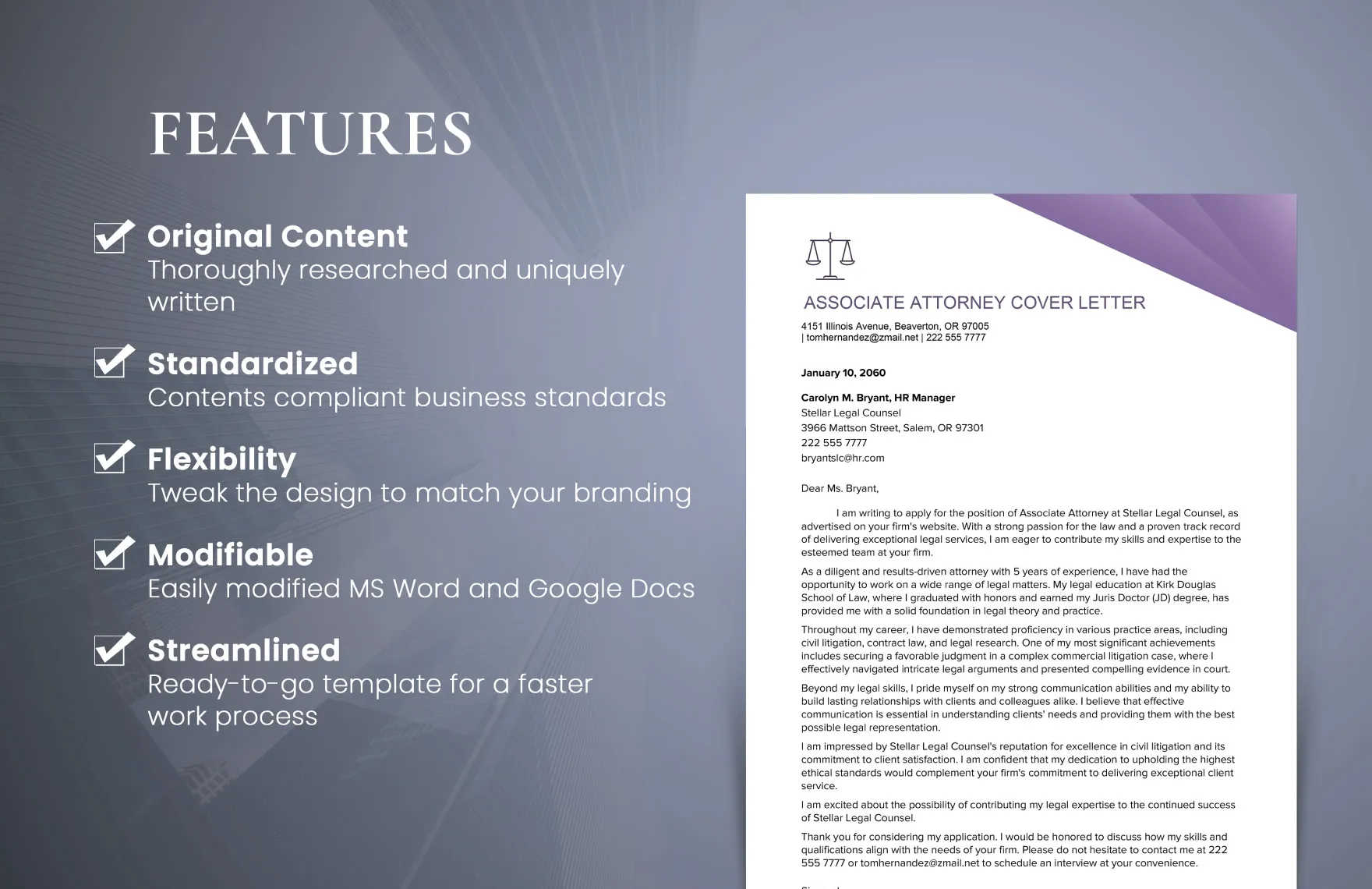
Use standard one-inch margins on all sides of the page. Ensure proper spacing, with single-spacing within paragraphs and double-spacing between paragraphs. This will make your cover letter easier to read and more visually appealing. Maintain a clean and organized layout.
Proofreading and Editing
Thoroughly proofread your cover letter for any grammatical errors, typos, or inconsistencies. Use spell-check and grammar-check tools. However, don’t rely solely on these tools; carefully review the document yourself. It is highly recommended to have another person read it over, as a fresh pair of eyes can catch mistakes you might have missed. A flawless cover letter demonstrates your attention to detail and professionalism.
Customizing Your Cover Letter
Researching the Law Firm
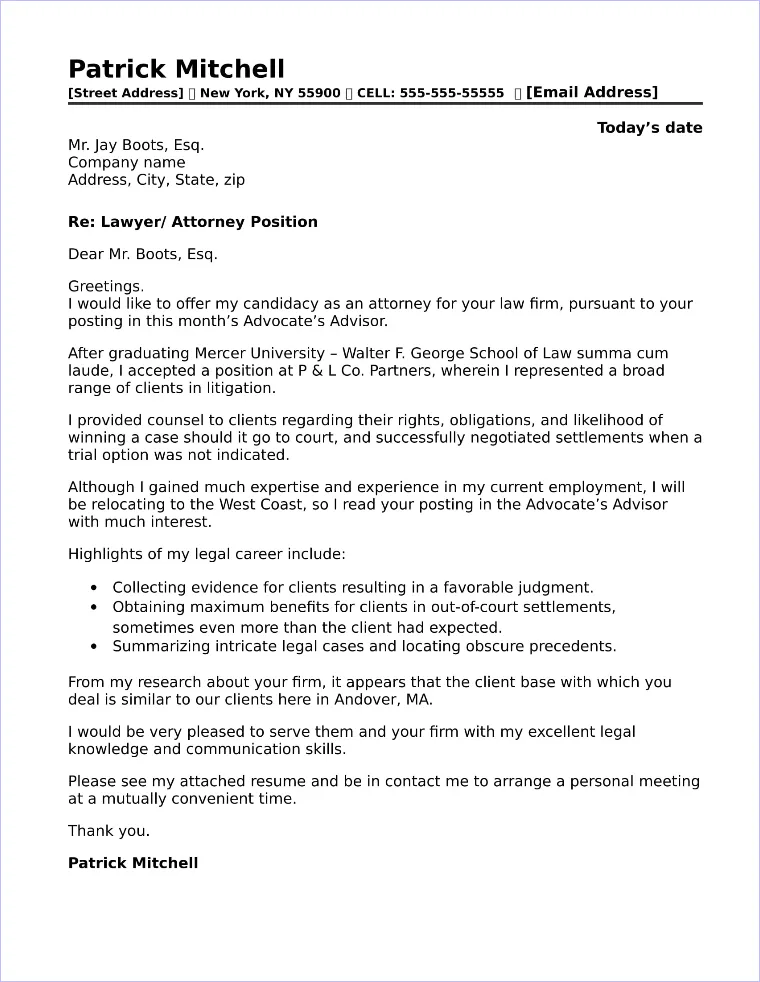
Before writing your cover letter, conduct thorough research on the law firm. Visit their website, read news articles about them, and understand their areas of practice. Tailor your letter to align with the firm’s culture, values, and recent accomplishments. The more you know about the firm, the better you can demonstrate your genuine interest and suitability for the role.
Tailoring to the Specific Job
Each cover letter should be customized to the specific job you are applying for. Carefully review the job description and identify the key requirements. Highlight the skills and experiences that directly match those requirements. Avoid using a generic cover letter; show how you can contribute to the firm’s specific needs.
Addressing Specific Requirements
Some job postings include specific requirements or requests. Carefully address any instructions provided in the job posting. If the posting asks for specific information or prompts, make sure you include it in your cover letter. Failing to follow instructions can lead to your application being overlooked.
Cover Letter Samples Examples
Reviewing samples can offer guidance on structure, tone, and content. Tailor the example to your specific circumstances.
Sample Cover Letter Recent Law Graduate
For recent law graduates, focus on your educational background, relevant coursework, and any internships or extracurricular activities. Highlight your skills, such as legal research, writing, and advocacy. If you have no prior experience, emphasize your passion for law and your eagerness to learn. Provide information from your internships and academic achievements, demonstrating your understanding of legal concepts.
Sample Cover Letter Experienced Lawyer
Experienced lawyers should emphasize their professional accomplishments, including case results, client successes, and areas of expertise. Highlight the impact you’ve made in previous roles and tailor your letter to show how your experience aligns with the firm’s needs. Focus on leadership, business development, and your ability to handle complex cases.
Common Mistakes to Avoid
Generic Letters
Avoid using a generic cover letter that could be sent to any firm. Customize each letter to the specific job and the firm’s requirements. A generic letter demonstrates a lack of effort and a lack of genuine interest in the role.
Typos and Grammatical Errors
Typos and grammatical errors can damage your credibility and make you appear unprofessional. Always proofread your cover letter carefully, and ask someone else to review it. Errors indicate a lack of attention to detail, which is crucial in the legal field.
Ignoring Instructions
Always follow the instructions provided in the job posting. If the posting requests specific information, format, or attachments, make sure to include them. Failing to follow instructions may result in your application being rejected.
